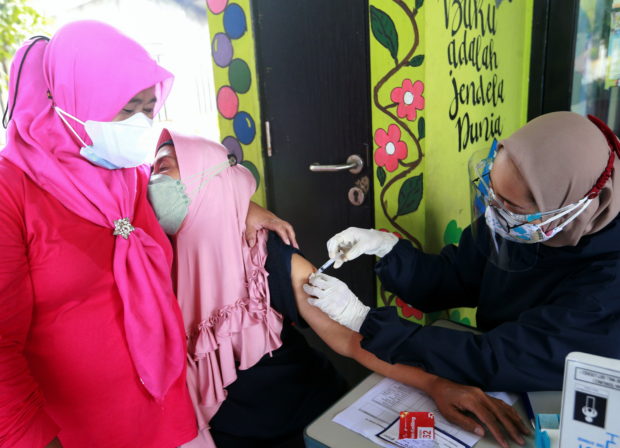
A woman reacts as she receives a vaccine against the coronavirus disease (COVID-19), as cases surge in Jakarta, Indonesia, July 8, 2021. REUTERS/Ajeng Dinar Ulfiana
JAKARTA — Indonesia and Thailand are considering offering a booster shot to their medical workers immunized with Sinovac’s COVID-19 vaccine, a move likely to reduce public trust in the Chinese product that has been their main inoculation tool.
Some countries including Turkey and the United Arab Emirates have already started giving a booster shot to those inoculated with Chinese vaccines amid concerns that they may not be as effective against new and more transmissible coronavirus variants.
But the challenges facing Southeast Asia are much bigger. Many countries in the region rely heavily on Chinese vaccines due to tight supplies of Western products, and have low vaccination rates of less than 10%.
They are also battling a record-breaking surge in new cases and deaths, led by the highly contagious Delta variant, while rising infections among medical workers despite being fully immunized with the Sinovac shots have stretched already thin healthcare systems.
“There’s a lot of doctors and medical workers who have been vaccinated twice but endured medium and severe symptoms, or even died,” Slamet Budiarto, deputy chief of the Indonesian Medical Association, told parliament on Monday.
Indonesia has vaccinated millions of its healthcare workers with the Sinovac shot and thousands of them are now testing positive for COVID-19.
“It is the time for medical workers to get a third booster to protect them from the impact of more vicious and worrying new variants,” said Melki Laka Lena, deputy chairman of the parliamentary commission overseeing health.
Siti Nadia Tarmizi, an official from Indonesia’s health ministry, said it is waiting for recommendations from immunization advisory group and Indonesia’s Food and Drug Agency (BPOM) about the use of a booster shot.
While some real world data showed the Sinovac vaccine is effective against hospitalization and severe COVID-19 cases, there is no detailed data yet on its effectiveness against the Delta variant, first identified in India.
Thailand, which expects to receive a donation of 1.5 million Pfizer-BioNtech shots from the United States later this month, plans to use it in inoculating its 700,000 medical workers, most of whom have already received two shots of Sinovac.
Senior health official Udom Kachintorn said the plan was aimed at increasing immunity, as the Delta variant increases case loads and scores of medical workers who had been fully vaccinated with the Sinovac became infected.
A leaked Thai health ministry document this week showed that the government was concerned about such a move sending a wrong signal to the public because it would be admitting that the Sinovac vaccine was not effective.
“It will definitely have an impact on the trust in the vaccine,” said Dicky Budiman, an epidemiologist at Australia’s Griffith University.
“The vaccine isn’t necessarily ineffective, but its efficacy slides down after six months. That’s my prediction,” he said, recommending authorities consider a booster shot as a solution and communicate the problems with the public.
Thai authorities have defended the vaccine’s use and its plan to purchase more Sinovac vaccines.
“Don’t downgrade Sinovac even though we know efficacy is lower. It reduces the number of patients with critical condition, and fatalities,” Udom said.
Indonesian doctors also acknowledge that Sinovac might not be the best vaccine on the market, but say that for now that is all they have, and that is better than nothing.
“Up to now because we cannot produce (a vaccine) we have no (other) option,” said Eka Julianta Wahjoepramono, the dean of the medical school at Pelita Harapan University.
“Sinovac is the only choice,” said Eka, who was fully vaccinated with the Sinovac but got a severe case of COVID-19 last month.
Sinovac did not reply to a Reuters’ request for comment.
‘Timely rain’ or still doubtful
Doubts about the effectiveness of Chinese vaccines threaten to undermine China’s so-called “vaccine diplomacy,” through which Beijing has sought to increase its diplomatic influence around the world. China has shipped hundreds of millions of doses of locally developed COVID-19 shots overseas.
Singapore said this week people who received the Sinovac shots are excluded from its count of total vaccinations due to a lack of efficacy data for the vaccine, especially against the contagious Delta variant.
“We don’t really have a medical or scientific basis or have the data now to establish how effective Sinovac is in terms of infection and severe illnesses on Delta,” health minister Ong Ye Kung said.
China reiterated that its vaccines are safe and effective.
“Chinese vaccines have earned a good reputation in the international community with their safety and efficacy widely recognized,” foreign ministry spokesman Wang Wenbin said on Monday in response to a question about whether other countries have expressed concerns about Chinese vaccines.
“To date over 100 countries have approved Chinese vaccines… The first batch of vaccines to arrive in many developing nations are from China. They refer to the Chinese doses as ‘timely rain’.”